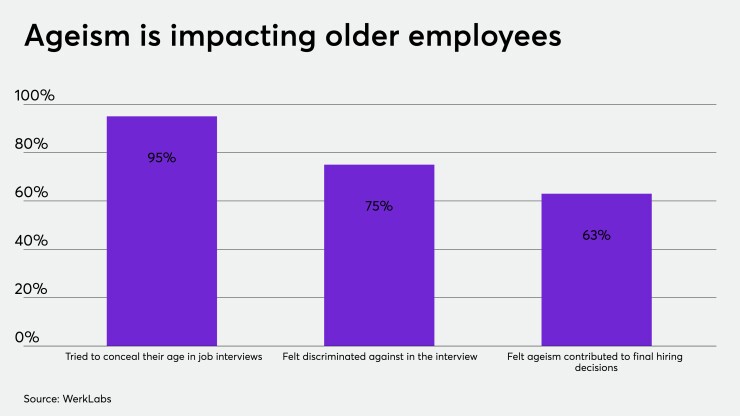Older employees have something they want to hide from prospective employers.
Ninety-five percent of workers over 40 say they have tried to physically hide or mask their appearance in interviews, out of fear of being discriminated against
Ageism can be subtle, but 90% of older workers believe it is common, according to AARP. The WerkLabs study found that 75% of workers felt
Read more:
While age discrimination is illegal, just 3% of employees have made a formal complaint to a supervisor or HR department, AARP found. But it’s important for both employers and employees to be aware of the subtle signals.
“Anything from language used in job descriptions to a hiring manager telling a prospective employee he or she is ‘overqualified’ can be considered age discrimination,” Dr. Pam Cohen, president of WerkLabs, said in a release.
The study found that age discrimination was most rampant in the financial services, advertising and technology industries. On average, 83% of workers in those fields said they experienced bias due to their age.
However, those industries are also the ones planning to expand post-COVID: 82% of employers plan to
Read more:
“Companies that are more diverse perform better and are more innovative because they can draw from diversity of thought,” says Bonnie Marcus, an executive coach. “HR needs to take a hard look at their own biases — we all have it. Make it part of your unconscious bias training.”
Marcus says age bias can reveal itself in subtle ways, yet older employees feel self-conscious about addressing side comments and slights. Being asked to include a graduation year, being grilled on tech-related questions, and having younger recruiters express surprise about a candidate's age can all sideline
“Their default behavior is to try to stay off the radar,” Marcus says. “[Candidates] are not speaking up about it because they don't want to face the consequences. They don't feel that they would be respected or they might think there will be other consequences.”
The WerkLabs survey found that 64% of applicants experienced age discrimination during the interview pre-screen, and 63% felt age bias expressed after the interview was completed. Sixty-three percent said discrimination was an apparent reason when told of a final hiring decision.
Employers should be conscious of the biases inherent in their recruitment process, Dr. Cohen said. Additionally, all employees should be given ample opportunities and training to advance their careers instead of being nudged out the door.
“All companies should re-evaluate their recruitment materials and career development programs, while educating hiring managers and employees on unconscious biases and ageist practices in work,” Cohen said. “Regardless of race, religion, gender or age, we all have something to contribute to our respective employers and we should feel empowered to do so.”






